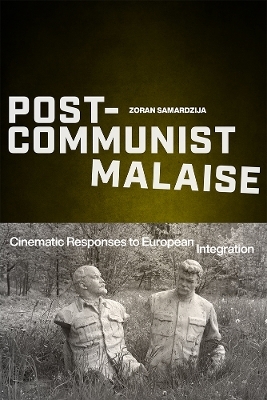
Post-Communist Malaise
Rutgers University Press (Verlag)
978-0-8135-8715-8 (ISBN)
The collapse of communism in the Soviet Union and Eastern Europe was supposed to bring about the “end of history” with capitalism and liberal democracy achieving decisive victories. Europe would now integrate and reconcile with its past. However, the aftershocks of the financial crisis of 2008—the rise in right-wing populism, austerity politics, and mass migration—have shown that the ideological divisions which haunted Europe in the twentieth century still remain. It is within this context that Post-Communist Malaise revives discourses of political modernism and revisits debates from Marxism and seventies film theory. Analyzing work of Theo Angelopoulos, Věra Chytilová, Srdjan Dragojević, Jean-Luc Godard, Miklós Jancsó, Emir Kusturica, Dušan Makavejev, Cristi Puiu, Jan Švankmajer, Andrei Tarkovsky, and Béla Tarr, the book focuses on how select cinemas from Eastern Europe and the Balkans critique the neoliberal integration of Europe whose failures fuel the rise of nationalism and right-wing politics. By politicizing art cinema from the regions, Post-Communist Malaise asks fundamental questions about film, aesthetics, and ideology. It argues for the utopian potential of the materiality of cinematic time to imagine a new political and cultural organization for Europe.
Zoran Samardzija is an associate professor in the Department of Cinema and Television Arts at Columbia College, Chicago. He is the author of essays on David Lynch, Andrei Tarkovsky, and Eastern European and Balkan cinemas.
Contents
Introduction
1 Eastern European New Waves and Political Modernism
2 What Happens After the End of History?
Part I From Communism to Capitalism
Part II From Capitalism to Nationalism
3 Slow Cinema and The Escape From Capitalist Realism
Part I The Materiality of Cinematic Time from Andrei Tarkovsky to Béla Tarr
Part II Cristi Puiu Between Slow Cinema and Transcendental Style
4 Theo Angelopoulos, Greece, and The Ends of Europe
Part I A New Collective Dream
Part II Cinema As Past and Future
Conclusion
Acknowledgements
Index
| Erscheinungsdatum | 17.07.2020 |
|---|---|
| Zusatzinfo | 0 illustrations |
| Verlagsort | New Brunswick NJ |
| Sprache | englisch |
| Maße | 152 x 229 mm |
| Themenwelt | Kunst / Musik / Theater ► Film / TV |
| Geisteswissenschaften ► Geschichte ► Regional- / Ländergeschichte | |
| Sozialwissenschaften ► Kommunikation / Medien ► Medienwissenschaft | |
| Sozialwissenschaften ► Politik / Verwaltung ► Europäische / Internationale Politik | |
| Sozialwissenschaften ► Soziologie | |
| ISBN-10 | 0-8135-8715-8 / 0813587158 |
| ISBN-13 | 978-0-8135-8715-8 / 9780813587158 |
| Zustand | Neuware |
| Haben Sie eine Frage zum Produkt? |
aus dem Bereich


